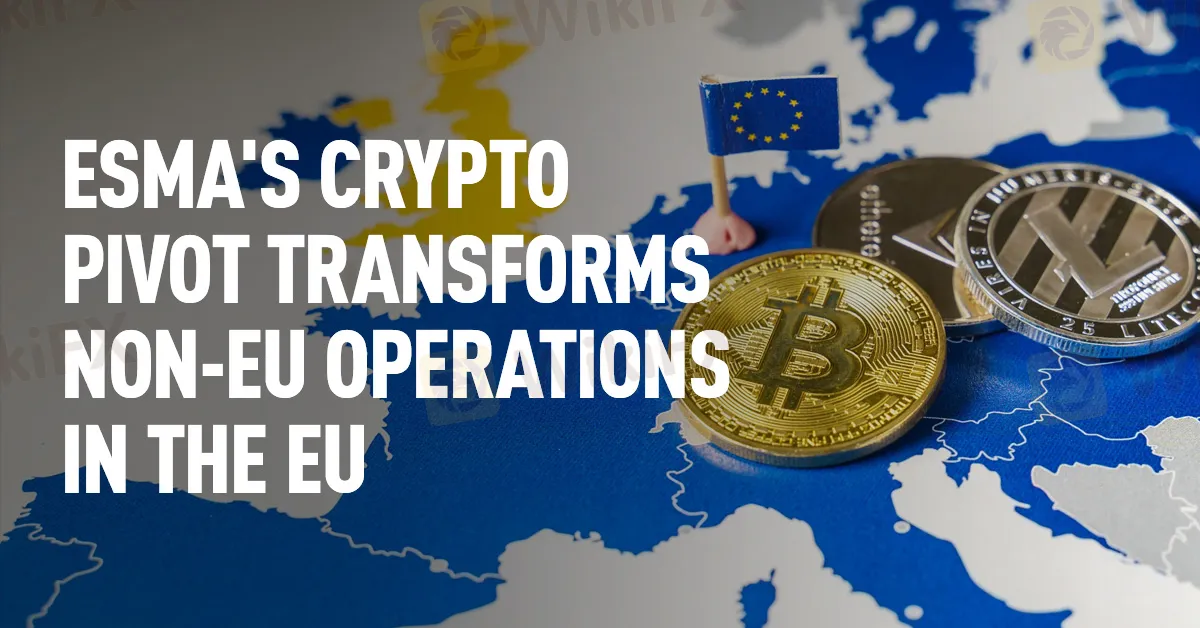简体中文
繁體中文
English
Pусский
日本語
ภาษาไทย
Tiếng Việt
Bahasa Indonesia
Español
हिन्दी
Filippiiniläinen
Français
Deutsch
Português
Türkçe
한국어
العربية
ESMA's Crypto Pivot Transforms Non-EU Operations in the EU
Abstract:ESMA proposes stringent limitations on non-EU crypto firms serving EU clients, emphasizing 'reverse solicitation' as an exception, potentially prompting foreign companies to establish a physical presence within the EU to comply with MiCA regulations.

The European Securities and Markets Authority (ESMA) has introduced a proposal with potential implications for the operations of non-EU crypto companies within the European Union.
The proposed guidelines aim to impose stringent limitations on how these firms serve EU customers directly, intending to curb unfair competition. This initiative follows the EU's enactment of the groundbreaking Markets in Crypto-Assets (MiCA) framework last year, representing a significant stride in regulating the inherently challenging cross-border nature of the online crypto sector.
ESMA's recent proposals, currently open for public consultation until the end of April, seek to provide clarity on the practical application of MiCA, particularly for crypto asset firms located outside the EU. According to ESMA's statement, non-EU firms can only offer crypto-asset services to EU clients if the client exclusively initiates the service, known as 'reverse solicitation,' a concept present in other EU financial laws.
ESMA emphasizes that this exemption should be narrowly interpreted and viewed as an exception rather than the norm. This stance may compel many foreign crypto firms to establish a physical presence within the EU, such as opening a branch or subsidiary, to adhere to the bloc's regulations.

In a commitment to safeguard EU-based investors and MiCA-compliant crypto-asset service providers, ESMA and EU national regulators are determined to hold non-EU entities to the same standards. The proposals strictly prohibit the direct solicitation of business within the EU by non-EU firms, including marketing campaigns.
Moreover, ESMA proposes guidelines to ascertain when a crypto asset should be classified as a “financial instrument,” similar to stocks or bonds. If categorized as such, these assets would fall under the EU's Markets in Financial Instruments Directive (MiFID) rules, introducing an additional layer of regulatory oversight.

Disclaimer:
The views in this article only represent the author's personal views, and do not constitute investment advice on this platform. This platform does not guarantee the accuracy, completeness and timeliness of the information in the article, and will not be liable for any loss caused by the use of or reliance on the information in the article.
Read more

Coinbase Targeted in $20M Extortion Plot After Customer Data Breach
Coinbase hit by hackers stealing customer data, demanding $20M. The crypto exchange refuses to pay, offers reward for culprits' arrest.

Forex or Crypto? A Clearer Look at Two Popular Trading Choices
As financial markets grow and change, two trading areas have gained strong attention: foreign exchange (forex) and cryptocurrency. How do you know which one might be a better fit for your investment goals? Read this article to find out!

BitGo Secures MiCA License, Expands Crypto Services Across the EU
BitGo Europe GmbH has received a MiCA license from BaFin, enabling the firm to offer regulated digital asset services across the European Union, boosting crypto adoption.

Radiant DAO Proposes Compensation Plan for Wallet Losses
Radiant DAO, a blockchain-based lending platform, has introduced a new proposal to compensate users who lost funds due to a wallet approval flaw in late 2024 and early 2025. The issue allowed hackers to take tokens from users’ wallets that had previously given Radiant contracts permission to use their funds.
WikiFX Broker
Latest News
FIBO Group Review 2025: Is This Forex Broker a Scam or Legit?
The Forces That Move Markets & How to Read Them
Trade Nation 2025 Review: Spreads, Platforms, FCA and ASIC Licenses
CNMV Warns of Clone Sites Targeting EU Investors
CONSOB Blocks Multiple Domains Linked to Five Unlicensed Platforms
Could IBKR Be the Next Big Trading Opportunity?
LiteFinance Launches Partner App to Boost Affiliate Earnings
Gold Suffers Largest Drop in Six Months — What’s Next?
Currency Calculator



